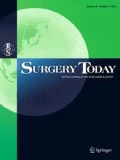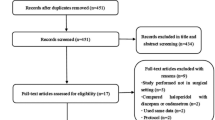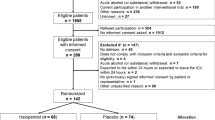Abstract
Purposes
The aim of this study was to evaluate the safety and efficacy of the early administration haloperidol in preventing the aggravation of postoperative delirium in elderly patients.
Methods
A total of 201 patients (age ≥75 years) who underwent elective surgery were enrolled. The patients were divided into two groups: the intervention group (n = 101) received prophylactic haloperidol (5 mg); the control group (n = 100) did not. Haloperidol was administered daily during postoperative days 0–5 to the patients who presented with NEECHAM scores of 20–24 when measured at 18:00. The primary endpoint was the incidence of severe postoperative delirium.
Results
The incidence of severe postoperative delirium in all patients was 25.1%. The incidence of severe postoperative delirium in the intervention group (18.2%) was significantly lower than that in the control group (32.0%) (p = 0.02). The difference between the two groups was larger when the analysis was limited to the 70 patients who had NEECHAM scores of 20–24 for at least one day during postoperative days 0–5. No adverse effects of the haloperidol were observed.
Conclusion
The prophylactic administration of haloperidol at the early stage of delirium significantly reduced the incidence of severe postoperative delirium in elderly patients.
Clinical Trial Registration UMIN000007204.





Similar content being viewed by others
References
Committee for Osteoporosis Treatment of The Japanese Orthopaedic Association. Nationwide survey of hip fractures in Japan. J Orthop Sci. 2004;9(1):1–5.
Isobe H, Takasu N, Mizutani M, Kimura W. Management of colorectal cancer in elderly patients over 80 years old (in Japanese). Nippon Ronen Igakkai Zasshi. 2007;44(5):599–605.
Katayama H, Kurokawa Y, Nakamura K, Ito H, Kanemitsu Y, Masuda N, et al. Extended Clavien-Dindo classification of surgical complications: Japan Clinical Oncology Group postoperative complications criteria. Surg Today. 2016;46(6):668–85.
Takiguchi S, Miyazaki Y, Takahashi T, Kurokawa Y, Yamasaki M, Nakajima K, et al. Impact of synthetic ghrelin administration for patients with severe body weight reduction more than 1 year after gastrectomy: a phase II clinical trial. Surg Today. 2016;46(3):379–85.
Meyer ZC, Schreinemakers JMJ, Waal RAD, Laan L. Searching for predictors of surgical complications in critically ill surgery patients in the intensive care unit: a review. Surg Today. 2015;45(9):1091–101.
Amemiya T, Oda K, Ando M, Kawamura T, Kitagawa Y, Fukata S, et al. Activities of daily living and quality of life of elderly patients after elective surgery for gastric and colorectal cancers. Ann Surg. 2007;246(2):222–8.
American Psychiatric Association. Diagnostic and Statistical Manual of Mental Disorders. Fourth Edition. Text Revision (DSM-IV-TR). Washington, DC: American Psychiatric Association; 2000.
McCusker J, Cole M, Abrahamowicz M, Primeau F, Belzile E. Delirium predicts 12-month mortality. Arch Intern Med. 2002;162(4):457–63.
Hattori H, Kamiya J, Shimada H, Akiyama H, Yasui A, Fukata S, et al. Assessment of the risk of postoperative delirium in elderly patients using E-PASS and the NEECHAM Confusion Scale. Int J Geriatr Psychiatry. 2009;24:1304–10.
Hatta K. Clinical Guideline for the Treatment of delirium japanese society of general hospital psychiatry practice guidelines 1. Tokyo: Seiwa Shoten; 2005. p. 19–47.
Inouye SK, Bogardus ST, Carpenter PA, Leo-Summers L, Acampora D, Holford TR, et al. A multicomponent intervention to prevent delirium in hospitalized older patients. N Engl J Med. 1999;340:669–76.
Guo Y, Sun L, Li L, Jia P, Zhang J, Jiang H, et al. Impact of multicomponent, nonpharmacologic interventions on perioperative cortisol and melatonin levels and postoperative delirium in elderly oral cancer patients. Arch Gerontol Geriatr. 2016;62:112–7 (Epub 2015/11/09).
Marcantonio ER, Flacker JM, Wright RJ, Resnick NM. Reducing delirium after hip fracture: a randomized trial. J Am Geriatr Soc. 2001;49:516–22.
Deschodt M, Braes T, Flamaing J, Detroyer E, Broos P, Haentjens P, et al. Preventing delirium in older adults with recent hip fracture through multidisciplinary geriatric consultation. J Am Geriatr Soc. 2012;60(4):733–9 (Epub 2012/03/21).
Moyce Z, Rodseth RN, Biccard BM. The efficacy of peri-operative interventions to decrease postoperative delirium in non-cardiac surgery: a systematic review and meta-analysis. Anaesthesia. 2014;69(3):259–69 (Epub 2014/01/03).
Siddiqi N, Harrison JK, Clegg A, Teale EA, Young J, Taylor J, et al. Interventions for preventing delirium in hospitalised non-ICU patients. Cochrane Database Syst Rev. 2016;3:CD005563 (Epub 2016/03/12).
Radtke FM, Franck M, Lendner J, Kruger S, Wernecke KD, Spies CD. Monitoring depth of anaesthesia in a randomized trial decreases the rate of postoperative delirium but not postoperative cognitive dysfunction. Br J Anaesth. 2013;110(Suppl 1):i98–105 (Epub 2013/03/30).
Zhang H, Lu Y, Liu M, Zou Z, Wang L, Xu FY, et al. Strategies for prevention of postoperative delirium: a systematic review and meta-analysis of randomized trials. Crit care. 2013;17(2):R47 (Epub 2013/03/20).
Zaal IJ, Devlin JW, Peelen LM, Slooter AJ. A systematic review of risk factors for delirium in the ICU. Crit Care Med. 2015;43(1):40–7 (Epub 2014/09/25).
Lin Y, Chen J, Wang Z. Meta-analysis of factors which influence delirium following cardiac surgery. J Card Surg. 2012;27(4):481–92 (Epub 2012/07/13).
Shehabi Y, Grant P, Wolfenden H, et al. Prevalence of delirium with dexmedetomidine compared with mnorphine based therapy after cardiac surgery. Anesthesiology. 2009;111(5):1075–84.
Korc-Grodzicki B, Root JC. Alici Y Prevention of post-operative delirium in older patients with cancer undergoing surgery. J Geriatr Oncol. 2015;6:60–9.
Trabold B, Metterlein T. Postoperative delirium: risk factors, prevention, and treatment. J Cardiothorac Vasc Anesth. 2014;28(5):1352–60 (Epub 2014/10/05).
Javedan H, Tulebaev S. Management of common postoperative complications: delirium. Clin Geriatr Med. 2014;30(2):271–8 (Epub 2014/04/12).
Holly C, Rittenmeyer L, Weeks SM. Evidence-based clinical audit criteria for the prevention and management of delirium in the postoperative patient with a hip fracture. Orthop nurs Natl Assoc Orthop Nurs. 2014;33(1):27–34 (quiz 5–6. Epub 2014/01/25).
Breitbart W, Alici Y. Evidence-based treatment of delirium in patients with cancer. J Clin Oncol. 2012;30(11):1206–14.
Inouye SK, Westendrop RGJ, Saczynsky JS. Delirium in eldrly people. Lancet. 2014;383(8):911–22.
Groen JA, Banayan D, Gupta S, Xu S, Bhalerao S. Treatment of delirium following cardiac surgery. J Card Surg. 2012;27(5):589–93 (Epub 2012/09/18).
Teslyar P, Stock VM, Wilk CM, Camsari U, Ehrenreich MJ, Himelhoch S. Prophylaxis with antipsychotic medication reduces the risk of post-operative delirium in elderly patients: a meta-analysis. Psychosomatics. 2013;54(2):124–31.
Fok MC, Sepehry AA, Frisch L, Sztramko R, Borger van der Burg BL, Vochteloo AJ, et al. Do antipsychotics prevent postoperative delirium? A systematic review and meta-analysis. Int J Geriatr Psychiatry. 2015;30(4):333–44 (Epub 2015/02/03).
Gosch M, Nicholas JA. Pharmacologic prevention of postoperative delirium. Z Gerontol Geriatr. 2014;47(2):105–9 (Epub 2014/03/13).
Neufeld KJ, Yue J, Robinson TN, Inouye SK, Needham DM. Antipsychotic medication for prevention and treatment of delirium in hospitalized adults: a systematic review and meta-analysis. J Am Geriatr Soc. 2016;64(4):705–14.
Hakim SM, Othman AI, Naoum DO. Early treatment with risperidone for subsyndromal delirium after on-pump cardiac surgery in the elderly: a randomized trial. Anesthesiology. 2012;116(5):987–97.
Larsen KA, Kelly SE, Stern TA, Bode RH Jr, Price LL, Hunter DJ, et al. Administration of olanzapine to prevent postoperative delirium in elderly joint-replacement patients: a randomized, controlled trial. Psychosomatics. 2010;51:409–18.
Prakanrattana U, Prapajtrakool S. Efficacy of risperidon for prevention of postoperative delirium in cardiac surgery. Anaesth Intensive Care. 2007;35:714–9.
Artemiou P, Bily B, Bilecova-Rabajdova M, Sabol F, Torok P, Kolarcik P, et al. Melatonin treatment in the prevention of postoperative delirium in cardiac surgery patients. Kardiochirurgia i torakochirurgia polska Pol J Cardio Thorac Surg. 2015;12(2):126–33 (Epub 2015/09/04).
Al-Aama T, Brymer C, Gutmanis I, Woolmore-Goodwin SM, Esbaugh J, Dasgupta M. Melatonin decreases delirium in elderly patients: a randomized, placebo-controlled trial. Int J Geriatr Psychiatry. 2011;26(7):687–94 (Epub 2010/09/17).
Sultan SS. Assessment of role of perioperative melatonin in prevention and treatment of postoperative delirium after hip arthroplasty under spinal anesthesia in the elderly. Saudi J Anaesth. 2010;4(3):169–73 (Epub 2010/12/31).
Tagarakis GI, Voucharas C, Tsolaki F, Daskalopoulos ME, Papaliagkas V, Parisis C, et al. Ondasetron versus haloperidol for the treatment of postcardiotomy delirium: a prospective, randomized, double-blinded study. J Cardiothorac Surg. 2012;7:25.
Kaneko T, Cai J, Ishikura T, Kobayashi M, Naka T, Kaibara N. Prophylactic consecutive administration of haloperidol can reduce the occurrence of postoperative delirium in gastrointestinal surgery. Yonago Ada Med. 1999;42:179–84.
Wang W, Li HL, Wang DX, Zhu X, Li SL, Yao GQ, et al. Haloperidol prophylaxis decreases delirium incidence in elderly patients after noncardiac surgery: a randomized controlled trial. Crit Care Med. 2012;40:731–9.
Kalisvaart KJ, de Jonghe JF, Bogaards MJ, Vreeswijk R, Egberts TC, Burger BJ, et al. Haloperidol prophylaxis for elderly hip surgery patients at risk fur delirium: a randomized placebo-controlled study. J Am Geriatr Soc. 2005;53:1658–66.
Vochteloo AJH, Moerman S, Borger BLS, et al. Delirium risk screening and haloperidol prophylaxis program in hip fracture patients is a helpful tools in identifying high-risk patients, but does not reduce the incidence of delirium. BMC Geriatr. 2011;11:39 http://www.biomedcentral.com/1471-2318/11/39.
Neelon VJ, Champagne MT, Carlson JR, Funk SG. The NEECHAM Confusion Scale: construction, validation, and clinical testing. Nurs Res. 1996;45(6):324–30 (randomized, open-label prospective trial).
Matsushita T, Matsushima E, Maruyama M. Early detection of postoperative delirium and confusion in a surgical ward using the NEECHAM Confusion Scale. Gen Hosp Psychiatry. 2004;26(2):158–63.
Schuurmans MJ, Deschamps PI, Markham SW, Shortridge-Baggett LM, Duursma SA. The measurement of delirium: review of scales. Res Theory Nurs Pract. 2003;17(3):207–24.
Immers HE, Schuurmans MJ, van de Bijl JJ. Recognition of delirium in ICU patients: a diagnostic study of the NEECHAM Confusion Scale in ICU patients. BMC Nurs. 2005;4:7.
Cockrell JR, Folstein MF. Mini-Mental State Examination (MMSE). Psychopharmacol Bull. 1988;24:689–92.
Anthony JC, LeResche L, Niaz U, von Korff MR, Folstein MF. Limits of the ‘Mini-Mental State’ as a screening test for dementia and delirium among hospital patients. Psychol Med. 1982;12:397–408.
Fukata S, Kawabata Y, Fujisiro K, Katagawa Y, Ando M, Hattori H, et al. Haloperidol prophylaxis does not prevent postoperative delirium in elderly patients: a randomized, open-label prospective trial. Surg Today. 2014;44(12):2305–13.
Mahoney FL, Barthel DW. The Barthel Index. Maryland State. Mad J. 1965;14:61–5.
Meagher D, O’Regan N, Ryan D, et al. Frequency of delirium and subsyndromal delirium in an adult acute hospital population. Br J Psychiatry. 2014;205:478–85.
Core MG, Ciampi A, Belzile E, et al. Subsyndromal delirium in older people: a systemic review of frequency, risk factors, course and outcomes. Int J Geriatr Psychiatry. 2013;28:771–80.
Shim J, DePalma G, Sands LP, Leung JM. Prognostic significance of postoperative subsyndromal delirium. Psychosomatics. 2015;56(6):644–51 (Epub 2015/07/23513).
Breu A, Stransky M, Metterlein T, Werner T, Trabold B. Subsyndromal delirium after cardiac surgery. Scand Cardiovasc J SCJ. 2015;49(4):207–12 (Epub 2015/04/30).
Blazer DG, Nieuwenhuizen AO. Evidence for the diagnostic criteria of delirium: an update. http://www.co-psychiatry.com. 2012;25(3):239–43.
Inoue SK, vanDyck CH, Alessi CA, Balkin S, Siegal AP, et al. Clarifying confusion: the confusion assessment method. A new method for detection of delirium. Ann Intern Med. 1990;113:941–8.
Trzepacz PT, Mittal D, Torres R, Kanary K, Norton J, et al. Validation of the Delirium Rating Scale-revised-98:comparison with the delirium rating scale and the cognitive test for delirium. J Neuropsychiatry Clin Neurosci. 2001;13:229–42.
Bergeron N, Dubois MJ, Dumont M, Dial S, Skrobik Y. Intensive care delirium screening checklist: evaluation of a new screening tool. Intensive Care Med. 2001;27:859–64.
Hempenius L, Leeuwen BL, Asselt DZB, et al. Structured analyses of interventions to prevent delirium. Int J Gen Psychiatry. 2011;26:411–50.
Popp J, Arlt S. Prevention and treatment options for postoperative delirium in the elderly. Curr Opin Psychiatry. 2012;25:515–21.
American Psychiatric Association. Practice guideline for the treatment of patients with delirium. Am J Psychiatry. 1999;156(suppl):1–20.
The American Geriatrics Society expert panel on postoperative delirium in older adults. American Geriatrics Society abstracted clinical practice guideline for postoperative delirium in older adults. JAGS J Am Geriatr Soc. 2015;63(1):142–50.
Acknowledgements
This work was supported by Research Funding for Longevity Sciences (23-28, 26-10) from the National Center for Geriatrics and Gerontology (NCGG), Japan.
Author information
Authors and Affiliations
Corresponding author
Ethics declarations
Conflict of interest
The authors declare no conflicts of interest in association with the present study.
Rights and permissions
About this article
Cite this article
Fukata, S., Kawabata, Y., Fujishiro, K. et al. Haloperidol prophylaxis for preventing aggravation of postoperative delirium in elderly patients: a randomized, open-label prospective trial. Surg Today 47, 815–826 (2017). https://doi.org/10.1007/s00595-016-1441-2
Received:
Accepted:
Published:
Issue Date:
DOI: https://doi.org/10.1007/s00595-016-1441-2




